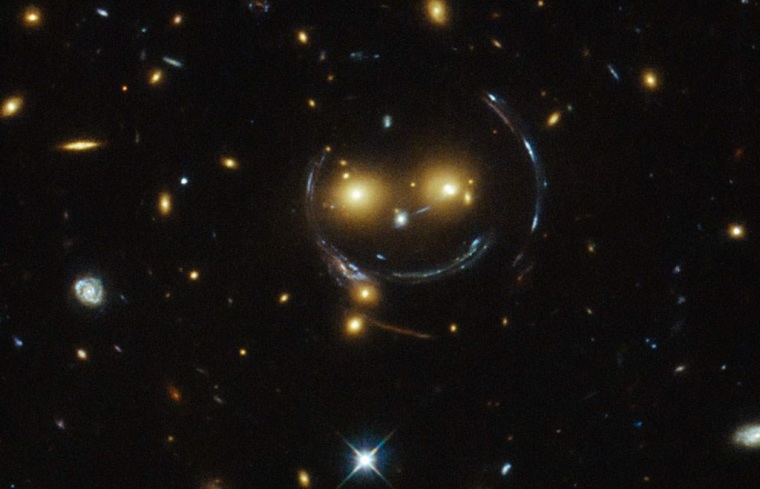Is the Universe Smiling Back? Hubble Space Telescope Discovers Happy Face in Space

The images captured by the Hubble Space Telescope have been making a lot people all over the world – from scientists to ordinary people – smile with wonder since it was launched more than two decades ago.
Now the Universe appears to be responding in kind. One particular image of the Universe taken by Hubble appears to be smiling right back at its viewers. Well, at least that's what it seems to look like when we look at it at a certain angle.
A deep space picture showed what seemed to be a pair of shining yellow "eyes" – a bright white nose, smears of curving light, and lines of partial circle surrounding the whole group.
Those figures actually do not exist since in the center of the image is actually a cluster of galaxies like SDSS J1038+4849.
The two orange eyes of the grinning face are actually two distant galaxies, and the peculiar smile was caused by an effect known as strong gravitational lensing, Time magazine explained.
"Galaxy clusters are the most massive structures in the Universe and exert such a powerful gravitational pull that they warp the spacetime around them and act as cosmic lenses which can magnify, distort and bend the light behind them," the European Space Agency explained.
"This phenomenon, crucial to many of Hubble's discoveries, can be explained by Einstein's theory of general relativity," it added in a post published on the Hubble website.
The ESA noted that the smiling face was caused by a special case of gravitational lensing, a ring – known as an Einstein Ring – that is "produced from this bending of light, a consequence of the exact and symmetrical alignment of the source, lens and observer that results in the ring-like structure."
ESA said the image was studied by Hubble's Wide Field and Planetary Camera 2 and Wide Field Camera 3 as part of a survey of strong lenses.
Hubble has been providing astronomers with the tools to probe these massive galaxies and model their lensing effects, allowing people to peer further into the early Universe than ever before, it added.
 Christians don't have to affirm transgenderism, but they can’t express that view at work: tribunal
Christians don't have to affirm transgenderism, but they can’t express that view at work: tribunal Archaeology discovery: Medieval Christian prayer beads found on Holy Island
Archaeology discovery: Medieval Christian prayer beads found on Holy Island Presbyterian Church in America votes to leave National Association of Evangelicals
Presbyterian Church in America votes to leave National Association of Evangelicals Over 50 killed in 'vile and satanic' attack at Nigerian church on Pentecost Sunday
Over 50 killed in 'vile and satanic' attack at Nigerian church on Pentecost Sunday Ukrainian Orthodox Church severs ties with Moscow over Patriarch Kirill's support for Putin's war
Ukrainian Orthodox Church severs ties with Moscow over Patriarch Kirill's support for Putin's war Islamic State kills 20 Nigerian Christians as revenge for US airstrike
Islamic State kills 20 Nigerian Christians as revenge for US airstrike Man who served 33 years in prison for murder leads inmates to Christ
Man who served 33 years in prison for murder leads inmates to Christ


 Nigerian student beaten to death, body burned over ‘blasphemous’ WhatsApp message
Nigerian student beaten to death, body burned over ‘blasphemous’ WhatsApp message 'A new low': World reacts after Hong Kong arrests 90-year-old Cardinal Joseph Zen
'A new low': World reacts after Hong Kong arrests 90-year-old Cardinal Joseph Zen Iran sentences Christian man to 10 years in prison for hosting house church worship gathering
Iran sentences Christian man to 10 years in prison for hosting house church worship gathering French Guyana: Pastor shot dead, church set on fire after meeting delegation of Evangelicals
French Guyana: Pastor shot dead, church set on fire after meeting delegation of Evangelicals ‘Talking Jesus’ report finds only 6% of UK adults identify as practicing Christians
‘Talking Jesus’ report finds only 6% of UK adults identify as practicing Christians Mission Eurasia ministry center blown up in Ukraine, hundreds of Bibles destroyed: 'God will provide'
Mission Eurasia ministry center blown up in Ukraine, hundreds of Bibles destroyed: 'God will provide' Church holds service for first time after ISIS desecrated it 8 years ago
Church holds service for first time after ISIS desecrated it 8 years ago Burger King apologizes for 'offensive campaign' using Jesus' words at the Last Supper
Burger King apologizes for 'offensive campaign' using Jesus' words at the Last Supper Uganda: Muslims abduct teacher, burn him inside mosque for praying in Christ’s name
Uganda: Muslims abduct teacher, burn him inside mosque for praying in Christ’s name